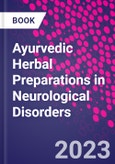Ayurvedic Herbal Preparations in Neurological Disorders provides a comprehensive and mechanistic understanding of the therapeutic potential of many ayurvedic herbal preparations in disease management. Examining research data for evidence-based ayurvedic approaches, this volume begins with a focused introduction to major ayurvedic plants, discussing various mechanisms underlying their neuromodulatory potential in preclinical and clinical settings. Major subsets of ayurvedic plants are discussed, including Bacopa monnieri, Centella asiatica, Withania somnifera, and others. This volume outlines the importance of integrative approaches along with existing treatments in the intervention/management of Alzheimer's disease, Parkinson's disease, depressive mood disorders, epilepsy, schizophrenia, and more.
More than a mere compilation of studies, this volume identifies relevant gaps for future research avenues and encourages interdisciplinary collaboration and sharing of knowledge to together identify the most efficacious ayurvedic approaches. Highlighting recent developments (e.g., Ayurgenomics, Ayurahar) and other pertinent research for neuroprotection, this book is crucial for anyone researching or working in the field of neurological disorder treatment and prevention.
Please Note: This is an On Demand product, delivery may take up to 11 working days after payment has been received.
Table of Contents
1. Ayurvedic herbal plants in Neurological disorders- status / Scope as golden nuggets
2. Overview of approaches in Ayurveda for neurological health and disorder
3. Polyherbalism
a panacea for management of neurodegenerative disorders
4. Insights on the neuroprotective strategies to alleviate neurodegenerative conditions: Role of Ayurvedic herbals and their bioactives: Clinical aspects
5. Multiple broad spectrum neuromodulatory effects of Bacopa monneri and Centella asiatica in preclinical/ clinical models: mechanistic considerations
6. Exploring the neuro-ameliorative propensity of Withania somnifera
Indian Ginseng
7. Indian Spices and their bioactives in Neurological disorders
8. Synaptic and mitochondrial alterations in Traumatic Brain Injury (TBI): Neuroprotective effects of phytochemicals/ herbal products.
9. Dietary Regulation of miRNAs involved in neurodegenerative diseases: Role of nutraceuticals/Ayurvedic herbals
10. Propensity of Ayurvedic herbs as modulators of Gut microbiome: Implications in Neurological disorders
11. Novel genetic modulators of neurodegenerative diseases as specific therapeutic agents
12. Therapeutic propensity of Natural polyphenols in Neurodegenerative disorders: Mechanistic insights
13. Phytochemicals for neurodegeneration and neuroinflammation: Medicine of the future or a mirage?
14. Plant-derived cognition enhancers for the management of Alzheimer's disease
15. Role of Ayurvedic herbs in the management of major depressive disorders(MDD)
16. Mass spectrometry-based approaches for identification of the molecular mechanism of action of Ayurvedic herbal medicines in PD
17. Insights into the efficacy of {i
Drosophila} as a predictive preclinical model to understand the mechanism of neuroprotection of Ayurvedic herbals
18. Caenorhabditis elegans models to study mode of action of Ayurvedic Nootropics at behavioral, cellular and molecular level
19. Utilization of Zebra fish as a preclinical model for obtaining insights on molecular mechanisms of neuroprotective role of ayurvedic herbal preparations
20. Acorus calamus in Neurological Disorders: A critical overview
21. Ayurvedic herbs and their potential as anti-aging therapies
22. Ayurvedic herbs and Yoga as immunomodulators
23. Yoga as a therapeutic intervention for the management of NDD
24. Benefits and concerns of nanotechnology in Ayurvedic medicine for neurological diseases.
25. Neuroprotective potential of plant-based bioactive polysaccharides: Molecular mechanisms and therapeutic advances
26. Ayurvedic herbals in Neurological disorders: Challenges, Limitations and Future perspectives








